Ah! So this is “Molecular Farming”
I sit in front of a computer and read stuff for a living, so when I see a term that’s new to me, I figure it’s new to you, too. “Molecular farming” is the latest.
I saw it in another newsletter, in connection with a Tokyo-based started up called Kinish that had just secured $800,000 in seed funding to “produce animal-free dairy proteins inside rice grains via molecular farming.” They will be doing the work in a vertical farm.
Cow-free “milk” produced in rice, eh?
Anyway, I wanted to know what molecular farming is, and the article didn’t expand on it, so I asked ChatGPT:
“Molecular farming is a biotech process that uses genetically modified plants to produce pharmaceutical compounds, industrial enzymes, or other valuable proteins. Instead of relying on traditional cell cultures or fermentation, scientists engineer plants—like tobacco, corn, or even lettuce—to act as ‘biofactories’ that produce proteins such as vaccines, antibodies, or even meat alternatives.
“The idea is that plants are relatively cheap, scalable, and safe compared to other production methods. For example, instead of making a vaccine in a lab with mammalian cell cultures, scientists could modify a plant to produce the same vaccine protein, then extract and purify it. This approach has been explored for everything from COVID-19 vaccines to cancer treatments.”
Ah! Well, whether or not it works, and whether or not there’s a market for plant-based milk (there is, judging from the almond milk craze), it sounds like a more lucrative and even sensible use of vertical farming than leaf lettuce and basil.

Quick grower videos from Tech on Demand
My young colleague Bill Calkins, who is the grower-communication portion of Ball Seed’s Tech on Demand (TOD) initiative, has been busy lately producing and editing podcasts and videos on a wide range of crop production topics. Some are long, but others are quite short—like a minute—and offer bite-sized tidbits that you can put to work right away.
You can find them in numerous convenient locations, including a YOUTUBE #SHORTS PLAYLIST, on the TOD Instagram page @BallTechOnDemand, on Ball Seed’s LINKEDIN PAGE and in the Greenhouse Tech Team FACEBOOK GROUP. Click your favorite link and make sure you subscribe or follow. Bill will be providing many more as we make our way through spring season and beyond.
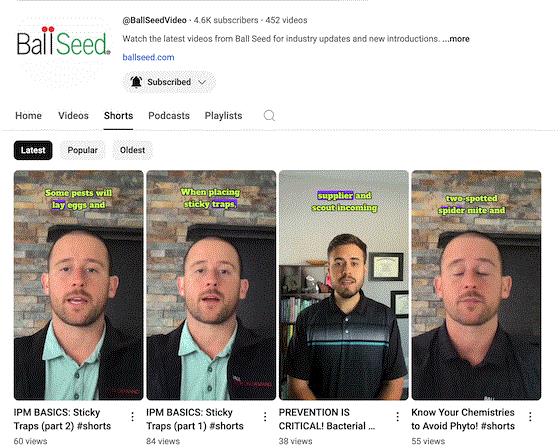
And let’s give a huge shout out to Ball’s technical services guys for making time to do this during their busiest season.
New and Novice Gardener Survey reveals what’s important
Is the COVID bump finally behind us? It sounds like it, at least based on a survey of 300 new and novice gardeners who say they plan to moderate the amount of time and money spent on gardening. And when they do buy, price will be more important to them.
I guess gone are the days of buying anything that’s not bolted down. But maybe you’ve already noted that trend last season?
This latest survey from Axiom Marketing, which specializes in insight-driven marketing and sales strategies for horticultural and other industries, reveals that gardeners who discovered the hobby over the past four years will keep gardening in 2025—that’s the good news! However, fewer will increase their garden spending and time spent gardening in the coming year.
“New and novice gardeners seem to be planning on moderating their garden pursuits in 2025,” says Mike Reiber, Axiom’s CEO. “Despite high satisfaction and feelings of success, most plan to spend the same amount of money and time in 2025. Fewer will increase their garden purchases and their time spent in the garden compared to 2024.”
Here are key findings in the survey:
- 2025 Garden Spending Maintaining but Trending Down. 54.6% plan to spend the same amount in 2025 as they did in 2024; however, respondents planning to spend more in 2025 fell by13.5 percentage points compared to 2024 study results.
- 2025 Time in Garden Maintaining but Trending Down. 47.1% will spend the same amount of time in 2025 as they did in 2024; however, respondents planning to spend more time in 2025 fell by 13.5 percentage points compared to 2024 study results.
- Plant More and Expand Gardens Increasing but Lower than 2024. 38.3% will plant the same amount as they did last year; however, respondents planning to plant more and expand their gardens in 2025 fell by 19 percentage points compared to 2024 study results.
- Fewer Likely to Pay More for The Plants They Want. Despite willingness to drive up to 10 miles to find the colors of flowers or vegetable plant varieties they want, 38.3% are unwilling to pay more—an increase of 12.8 percentage points compared to the 2024 study results. Price (12.3%) is cited as the third most important factor in plant purchase decisions. Specific variety of plant (32.6%) and national brand (14.5%) are the top two most important factors.

Organics and seed down in importance, too (Axiom, continued)
- Organically and Locally Grown Less Important. Organically and locally grown plants are likely less important in 2025, falling 18.8 and 15.5 percentage points, respectively, compared to the 2024 study.
- Seeds Less Important. Buying seeds to grow garden plants and planting seeds to save money decreased 22 percentage points and 9.4 percentage points, respectively, compared to the 2024 study.
Said Mike of the above two stats, “New and novice gardeners seem to be more price-sensitive based on price being the third most important plant purchase attribute. Perceived price differences may explain why organically and locally grown plants are less important in 2025. In our 2025 Gardening Outlook Study, price did not surface as a major issue when it comes to garden purchases.”
As for the methodology, Axiom recruited 300 new gardeners who’ve gardened four years or less, who own a home and who purchased a garden plant in 2024. Of these respondents, 35.2% are first time gardeners and 64.8% have gardened 2-4 years. Three-quarters (75.8%) characterize themselves as casual gardeners. More than three-quarters of respondents live in urban or suburban environments in the United States.
To download the 2025 Axiom New and Novice Gardener Study click HERE.

Just a few more weeks to register for CAST
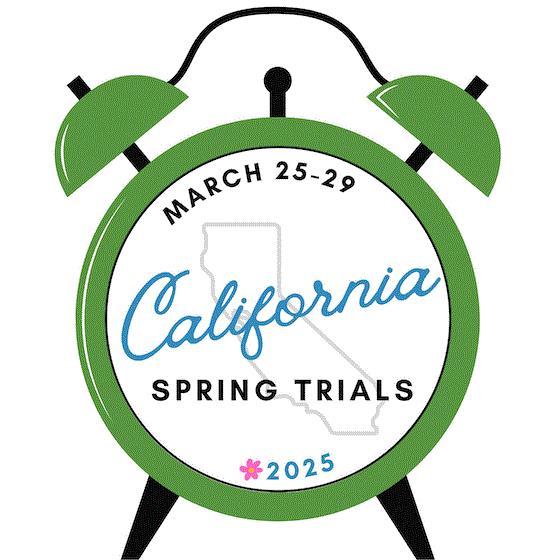
If you’re planning on attending the California Spring Trials—aka CAST—you need to book your trial reservations through the National Garden Bureau pronto—specifically, by Monday, March 17. Otherwise … well, I don’t know what will happen. Something drastic, I’m sure!
NGB has implemented a new, user-friendly registration system where you will find clear instructions for creating your personalized schedules. It’s especially convenient for groups, enabling one person to register up to 10 traveling companions. The site also provides valuable resources, like two suggested itineraries, plus hotel and restaurant recommendations. And the site will provide pre-event press releases, real-time coverage during the event and post-event summaries.
Another benefit: Just one badge for your whole trip, which you’ll pick up at your first stop.
What’s CAST? And why go?
I assume you long-time Pack Trials … er, California Spring Trials attendees are booked and ready to travel. But for those of you who’ve never been, or never even heard of it, CAST is the premier event for new flower and plant varieties in North America, taking place March 25-29 at various locations throughout central California, and it offers industry professionals a glimpse into the future of horticulture, showcasing the latest plant varieties and breeding advancements.
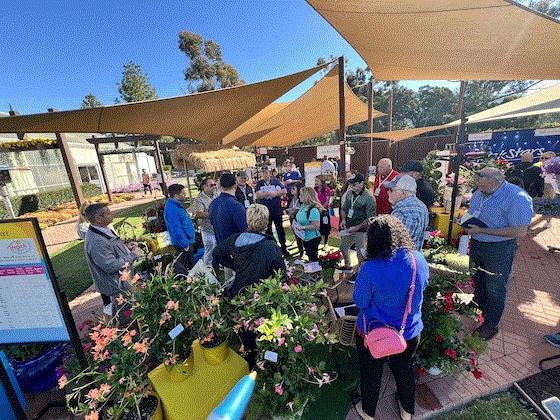
If you’re in the industry, whether grower, retailer, allied supplier, educator or something else, it should be on your horticultural bucket list. Here are a few folks telling you why, courtesy of NGB:
Amy Morris, Vice President, N.G. Heimos Greenhouse: “CAST holds a special place in my heart. As a young new grower, I used to attend with my father and he would show me all the new and upcoming items that breeders were working on. Now, 40 years later, I bring my team with me and we look for opportunities to makes our company unique for our customers. We get to see everything coming up the pipeline. And as a bonus, you are able to see all the industry’s finest people; so many friends that you have met throughout the years that have helped you and you’ve helped them out. This industry is big, but it is also very small when it comes to the people you work with. I enjoy CAST being the premier trial of spring and new beginnings.”
Brian Weesies, General Manager, Mast Young Plants: “CAST plays a valuable role in Mast Young Plants’ new variety selection process each year. We begin evaluating potential new varieties by growing them in our Michigan greenhouses, and our visit to CAST allows us to continue evaluating varieties at breeders’ facilities in California. CAST also provides the opportunity for us to speak directly with plant breeders, connect with colleagues across the industry, and learn about upcoming industry trends. These valuable experiences at CAST play an important role in the varieties that MYP decides to offer to our customers for the upcoming season.”
Susie Raker, Vice President, Raker-Roberta’s Young Plants: “CAST is an important part of the program development process for Raker-Roberta’s Young Plants. It’s one of the first places we get to see new introductions live and in person. The uniqueness of the event allows us one-on-one time with breeders to learn about their new products, review older genetic lines, and see what is coming down the pipeline. We frequently see new technology and treatments in the industry, and it affords the opportunity to interact with and exchange information with other industry members in a laid back, comfortable atmosphere.”

Lots of veggies at CAST … and Young's
Back in the day (say, the 1990s), CAST was 90% annual bedding plants. I don’t know what the breakdown is today, probably 50% annuals and 50% everything else—including veggies.
For an interesting take on garden veggies, Young’s Plant Farm in Alabama has done something unique as part of the Southern Garden Tour*: They’ve partnered with Food U, a program at Auburn University that provides sustainable, student-grown food for on-site consumption. In collaboration with Food U, the 2025 Young’s Plant Farm Trial Garden will feature herbs, vegetables and edible flowering annuals throughout the trial garden.
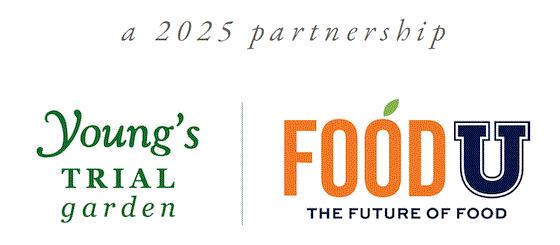
Jack Maruna, Food U Coordinator for Auburn, will be present at the Trial Garden Open House to answer any questions about edible gardening and how their program has changed the way Auburn University eats. Guests to Young’s trial will also be able to arrange for a tour of the rooftop garden at The Laurel hotel. The rooftop garden is a unique hotel feature, providing fruits, vegetables, herbs and edible flowers to be used at the 1856-Culinary Residence and by students in the culinary laboratories. This partnership between Horticulture and Hospitality offers both disciplines an opportunity to better understand how their food is grown and just as importantly, how it ends up on the plate sitting in front of a guest.
Learn more HERE.
*The Southern Garden Tour, June 4-6, features three southern U.S. plant trials: Young’s Plant Farm (June 3), University of Georgia (June 4) and Metrolina Greenhouses (June 5).

AmericanHort and H-2B Workforce Coalition advocate for more seasonal labor
Earlier this month, AmericanHort and the H-2B Workforce Coalition wrote a letter to the Trump administration emphasizing the critical role of the H-2B visa program in supporting seasonal businesses and preserving U.S. jobs. The letter highlights the extensive efforts made by businesses to recruit American workers before turning to temporary foreign labor. And it underscores the need to increase the outdated 66,000-worker annual visa cap.
The Coalition urges the administration to extend authority for supplemental visas and work toward long-term reform to ensure businesses can meet their labor needs while sustaining economic growth. More and more greenhouse and nursery operations are turning to the H-2B program to find the seasonal workers they need to get springtime jobs done.
The H-2B Workforce Coalition is comprised of thousands of employers and their representatives from the lodging, landscaping, seafood, restaurant, tourism, equine, forestry, amusement parks, golf courses and other industries.
You can read their full letter HERE.

AdeptAg adds Danish moving gutters
AdeptAg, One of North America’s leading horticultural solutions provider, has announced a strategic partnership with FGM, a Danish innovator known for its Moving Gutter Systems (MGS). FGM’s Moving Gutter System has gained international acclaim among growers for its capacity to optimize space and enhance plant growth. Designed for crops such as lettuce, herbs, vegetables and other leafy greens, MGS offers improved efficiency and sustainability.
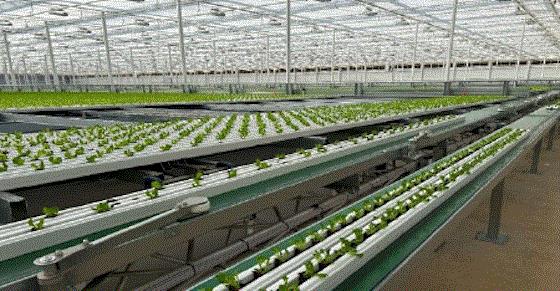
AdeptAg will serve as the exclusive North American distributor for FGM’s grow systems and various FGM-manufactured horticultural equipment, enabling growers across the continent to access this cutting-edge, labor-saving technology. AdeptAg’s family of companies—Agrinomix, Zwart Irrigation and Plantech Controls—will contribute to these projects.
David Stienes, AdeptAg’s CEO, says, “North American leafy green, vegetable and herb producers face the challenge of finding reliable growing systems that keep them competitive in the market for years to come. We know our partnership with FGM’s Moving Gutter Systems will enable us to provide the most comprehensive solution on the market, along with the ability to maintain and service that technology throughout its lifecycle—a service that no other provider can truly match today.”
Jeff Warschauer, FGM’s Director of Business Development and Key Account Sales, echoed this sentiment, adding, “A more formal cooperation was the logical next step after many successful years of collaboration with AdeptAg on various projects in North America. We know this partnership will provide growers with the best of both worlds—advanced technologies and exceptional North American service.”

GrowSpan to show off new Venlo-style greenhouse
On Thursday, April 3, GrowSpan Greenhouse Structures will cut the ribbon on their new state-of-the-art Venlo*-style greenhouse at their Dyersville, Iowa, campus. GrowSpan’s Venlo greenhouse project represents years of research and development, they say, as well as significant investments made in manufacturing facilities ($13 million) and infrastructure.
Spanning nearly one acre, the newest of GrowSpan’s greenhouse offerings boasts approximately 25,000 sq. ft. of growing space, a hot-dipped galvanized steel frame, 4-mm glass glazing on the roof and sides and cable-driven climate screens.
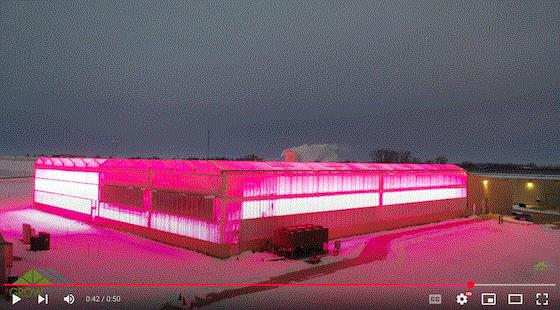
Partition walls divide the growing space into three zones, each one tailored to an individual crop. Zone 1 features a deep-water lettuce cultivation system with above-ground ponds and polystyrene rafts; Zones 2 and 3 feature suspended gutter cultivation systems for tomato and strawberry. Additionally, the Venlo-style greenhouse is outfitted with the latest climate control equipment, including HAF and AHU fans, vertical sliding windows, hydronic heating systems, LED lighting, high-pressure foggers and more.
For more information or to RSVP for the grand opening, click HERE.
*A Venlo-style greenhouse is a specific type of commercial greenhouse design that originated in the Netherlands. They feature multiple spans, gabled roofs with narrow bays, large glass panels glazing the roof and sides for high light transmission, roof vents for good ventilation, and plenty of interior space for efficient growing and use of mechanization/automation.

Convince a school to build a greenhouse
More and more local school districts are incorporating horticulture into their STEM (science, technology, engineering, mathematics) programs. But to really teach it effectively and hook students on horticulture as a career, you need a greenhouse.
To that end, greenhouse manufacturer Stuppy, of Kansas City, Missouri, offers some great arguments you can share with your school district to convince them to invest in a school greenhouse to enhance their STEM education program:
Make the theoretical come to life. Reading about plant biology, ecosystems and propagation is beneficial to students, but hands-on learning will provide more practical skills, such as problem-solving and critical thinking opportunities for your students. Watching students plant and maintain crop health, testing the effects of different fertilizers on seedlings, or modify temperatures using controllers—all are fantastic way to promote learning.
Take a casual interest and turn it into a career. STEM courses are part of the core curriculum, but it could be the class that inspires new passion for students. They may discover their love for horticulture, agricultural engineering, food science or environmental science. With your support, a school greenhouse and a developed FFA or 4-H program, your students have the potential to gain access to higher education through internships and scholarships.
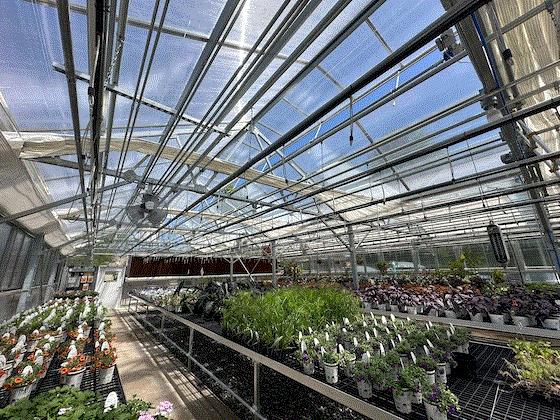
Experience the full growth cycle. While you can sprout a few seeds in a paper towel or care for indoor houseplants in a classroom, a school greenhouse provides the immersive, full-cycle experience of STEM education. Students will gain a deeper sense of responsibility through analyzing plant growth and diagnosing any issues that may arise through a full growth cycle.
Promotes interdisciplinary projects. There’s more to ag education than just growing plants. With an annual spring sale, for instance, your students can take their ag education and economics classes and learn how to run a small business. A school greenhouse promotes a wide range of subjects for all students to enjoy. It connects STEM courses to business, art and health courses, to name a few.
Encourages a connection to the community. A school greenhouse allows students to grow plants to be used for local fundraising events to help fund ongoing greenhouse operations. Parents and community members could enjoy an open house event for students to showcase their growth. Or the students may utilize the greenhouse for 4-H or FFA projects that may require community assistance.
Says Stuppy, “A school greenhouse offers amazing expansion to the lessons in your STEM program, but the entire school enjoys the benefits, too.”
Meet Stuppy’s newest sales rep

Speaking of Stuppy, they just announced that Brooke Wine is their new Regional Sales Manager for the Great Lakes Region—Michigan, Indiana, Ohio and Pennsylvania. Brooke has extensive experience in business development and management, and she’s excited to assist educational agriculture programs in her new role (like working with schools on STEM greenhouses, above).
Brooke holds a degree in entomology, making her a professional “bug nerd” and giving her a unique perspective on plant health and how to manage pests in the greenhouse.
Welcome to the greenhouse side of the industry, Brooke!
Finally …
This weekend, I’m attending an interesting new horticulture event: PlantCon Orlando 2025. To be held at a hotel on International Drive, PlantCon is expected to attract some 70 vendors, selling plants and accessories to a crowd of 3,000 plant geeks from 37 states and three countries (based on preregistration).
But it’s not just buying and selling. PlantCon International (says the website) was created to “fortify and bolster local plant communities across the nation by providing horticultural education and exposure, promoting horticultural appreciation, and providing a hub for connection, intellectual exchange and otherwise impossible connections to be formed between local businesses, community members and industry leaders.” Besides Orlando, there’s also a PlantCon Houston and PlantCon Dallas.
I’ll tell you more about it (including how much or little the wife and I spent on plants) next time.
Feel free to email me at beytes@growertalks.com if you have ideas, comments or questions.
See you next time!

Chris Beytes
Editor-in-Chief
GrowerTalks and Green Profit
This e-mail received by 29,690 loyal readers!
Thanks to my loyal sponsors, who help me reach the 29,690 readers of Acres Online in more than 60 countries. Want to be one of them (a sponsor, that is)? Give Kim Brown a shout and she will tell you about our many advertising opportunities.